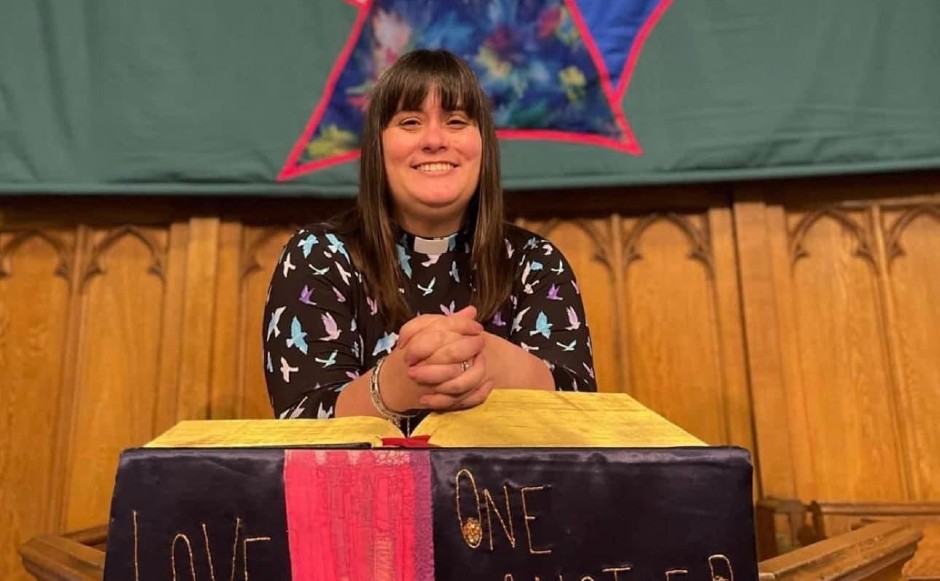A reflection for Holy Week
Published on 16 April 2025 5 minutes read
This Holy Week Neill Shaw, Priority Areas development worker in the Faith Action programme, has written this moving reflection on Christ: servant and king.
Priority areas are communities where deprivation rates fall within the bottom 5% across all of the social and economic indicators.

Mercy that Serves to the End
In Holy Week, we journey with Jesus through some of the most profound moments of His life, towards the cross: the pinnacle of His calling and ministry. Today we come to a place that might be described as a hard place, like a bog when climbing a mountain. We consider John 13:21-32, which opens a window to Jesus' deep inner struggle as He faces betrayal.
"Jesus was troubled in spirit" John 13:21
Yet, even as Jesus names the one who will betray Him, He does not withhold His love or turn away from the path ahead. This is mercy from the throne of God: mercy that goes all the way to the cross.
This perspective on Holy Week is not only a story about what Jesus did, but is a call to those who follow Him, to embody that same servant-hearted mercy in our own lives, churches, and communities – even when it is difficult and costly. The other passages we will look at; Isaiah 50:4-9, Psalm 70, Hebrews 12:1-3, remind us that such mercy often comes with weariness, pain, and struggle – but also with hope.
Mercy that Stands Firm in the Face of Betrayal
In John 13, Jesus does not walk away from Judas, even as He knows what is about to happen. "Very truly I tell you, one of you is going to betray me" (John 13:21). Jesus' mercy is not naïve – it is fully aware of the cost and yet continues to walk the painful path of self-sacrificial love. This is the kind of mercy Jesus spoke of earlier in His ministry, when He said:
"If you love those who love you, what reward will you get? Are not even the tax collectors doing that?" (Matthew 5:46)
In other words, true mercy is not proven when we love those who love us back, but when we love those who may hurt us.
Hebrews 12:2 echoes this, calling us to "fix our eyes on Jesus, the pioneer and perfecter of faith. For the joy set before him he endured the cross, scorning its shame". Jesus' mercy is not a comfortable or easy kindness, it is a mercy that endures betrayal and suffering for the sake of love. This same mercy is reflected in the life of the church when it continues to love and serve people even when trust is broken, when relationships are complicated and when it might be easier to give up.
A woman who attends a Priority Areas church spoke about what it means to be loved by her church community when she was at her lowest:
"People here have helped me so much, and they don't give up on you. Even when you're a mess, they keep showing up."
This is the servant heart of Jesus alive in His people today – mercy that stays, even when staying is difficult.
Mercy that Sustains the Weary
Isaiah's words speak directly to this kind of costly mercy; "The Sovereign Lord has given me a well-instructed tongue, to know the word that sustains the weary." (Isaiah 50:4). God's servants know how to speak life to those who are struggling, and in context, this is not an easy task. Isaiah also writes: "I offered my back to those who beat me, my cheeks to those who pulled out my beard; I did not hide my face from mocking and spitting." (Isaiah 50:6) – a prophetic picture of the teaching and suffering of Christ, but also a reminder that sustaining the weary often comes at great personal cost.
Often, while visiting Priority Area churches, people speak of how the church had been a source of that type of mercy: a presence that sustains, when life is falling apart. One man shared, simply and powerfully:
"If it wasn't for them, I wouldn't be here. I wouldn't be here."
Sometimes, it looks like just simply sitting beside someone in their darkest hour. It looks like being there, day after day, when nothing seems to change. It looks like being willing to carry another's sorrow without fixing it.
Jesus taught in Matthew 25 that the works of mercy are not just acts of charity, but signs of living out God's kingdom:
"For I was hungry and you gave me something to eat, I was thirsty and you gave me something to drink, I was a stranger and you invited me in, I needed clothes and you clothed me, I was sick and you looked after me, I was in prison and you came to visit me." (Matthew 25:35-36)
When the church sustains the weary, we offer the very mercy of Jesus: feeding the hungry; welcoming the stranger; offering our presence in ways that make the world a little more like God's kingdom.
Mercy that Cries Out for God's Help
Psalm 70 gives us a crucial reminder: mercy does not always feel strong. To serve others in love, to keep going when everything in us wants to stop, is often a cry to God for help. "Hasten, O God, to save me; come quickly, Lord, to help me." (Psalm 70:1). When we think of servant-hearted mercy, we sometimes imagine a kind of heroic strength. But Jesus was "troubled in spirit" (John 13:21), and the church is called serve out of weakness, not strength. A Priority Area leader said it plainly:
"It's really tough sometimes. But we keep going because we believe that's what Jesus calls us to do."
This is a mercy that cries out to God, recognising that the work of love and service is too big for us alone. As Hebrews urges us, we are called to "run with perseverance the race marked out for us, fixing our eyes on Jesus" (Hebrews 12:1-2). The call to serve like Jesus is a call to keep going in love, while leaning entirely on God's help to do so.
Mercy to the End
In these scriptures, we see a portrait of Jesus' servant heart: a mercy that stays even in betrayal; a mercy that sustains others even in weariness; a mercy that cries out for God's help when the way is too hard to walk alone. In all my conversations, over the last two years, with people who live, work, worship and serve in Priority areas, the same message comes across again and again: this kind of mercy – real, costly, enduring – has made the difference between hope and despair. One woman put it best:
"They're just amazing people. They've made me feel like I'm part of something again."
As we journey with Jesus this week, let us look again at His mercy – not only to give thanks for His mercy to us, but to ask what it means to follow Him in showing that mercy to others. And God will be our help: as Psalm 70 reminds us, "Come quickly, Lord, to help me."
As we move towards the cross this week, may we remember that the servant heart of Jesus is also the calling of His church.


